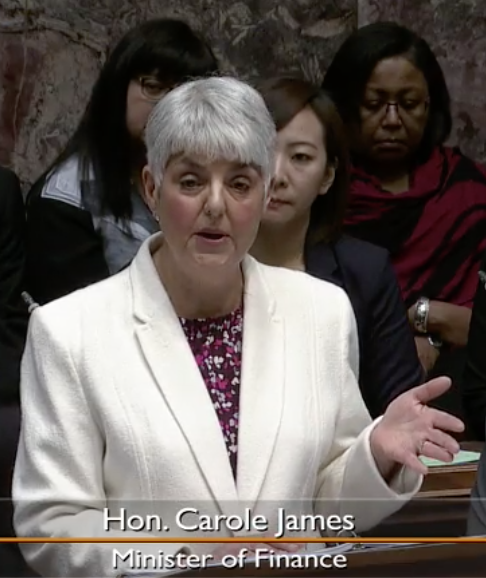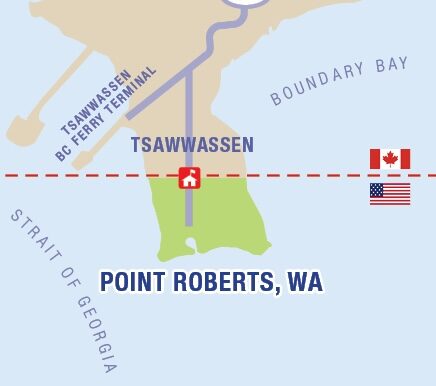
Bob Mackin
Amid a money laundering crisis in British Columbia, the NDP provincial government is giving the gambling regulator a boost of just $200,000 for the next fiscal year.
Meanwhile, an extra $2.4 million is allotted for government advertising that the party called wasteful when it was in opposition. It is also sending another $6 million to the Legislative Assembly, which is under a cloud of corruption and waste.
That, from the budget for the 2019-2020 fiscal year, tabled Feb. 19 by Finance Minister Carole James.

Finance Minister Carole James, Feb. 19, 2019 (Hansard)
Clerk Craig James and sergeant-at-arms Gary Lenz were suspended Nov. 20 and are under RCMP investigation. A report by speaker Darryl Plecas revealed overspending and corruption. The government plans to eventually add the Legislature to the freedom of information law. But, in the meantime, the budget includes a $6 million increase to $83 million for April 1, 2019 to March 31, 2020. That is driven by $1.87 million more in capital expenditures, almost $1 million more for members’ services, nearly half-a-million for the sergeant-at-arms and a whopping $3.35 million more for Legislative operations.
“Obviously there is going to be a lot of scrutiny on the Legislative budget over the next while, so I will save my comments, because there will be a number of people speaking to that budget and the specifics,” James said in a news conference before delivering the budget speech in the Legislature.
The Gaming Policy and Enforcement Branch sees a $202,000 bump to its budget, for $19.43 million over the next fiscal year. By comparison, Government Communications and Public Engagement, the central advertising and public relations agency within James’s ministry, is getting a $2.42 million increase to $37.8 million.
“We are in fact looking at how we modernize our approach to advertising, we’re increasing the number of town halls both online as well as telephone town halls,” James said. “But the other big piece we’re looking at, that’s really why you’ve seen an increase in this budget, is we have, compared to the past government, a number of programs and services for people to apply to, to be able to benefit… we need to ensure the people have that information so they know those programs are available to them, and we make sure that people are applying to them.”
The budget, which was foreshadowed by the Throne Speech a week earlier, contains no funding for a public inquiry on money laundering related to casinos and the real estate market. James said the government is awaiting two expert reports on real estate and luxury items before determining next steps. It has not ruled out a public inquiry, though Premier John Horgan has expressed a preference to stay the course instead of following the lead of Quebec’s Charbonneau Commission, which examined corruption in the construction industry.
“It’s important to make sure that we know what we’re funding,” James said. “We won’t know that until we see the reports coming in.”
After the elimination of the government’s operating debt, James said ministers will be free to make budget requests to the Legislature during the fiscal year, under the supplementary estimates regime.
The budget, James’s third, contains billions of dollars of more spending, but no new tax measures other than those previously announced, such as the April 1 $5 increase to the carbon tax, making it $40 per tonne.
Overall, this year the NDP expects to spend $58.27 billion and bring in $59 billion. James is forecasting a $274 million surplus. But the debt will rise from $67.8 billion to $72.5 billion.
The budget includes $1 billion in new social spending on the B.C. Child Opportunity Benefit, eliminating B.C. student loan interest, and hiking welfare rates.
- $26 million hike in disability assistance. Rates will be up $50 per month, to $1,800 a year per person;
- $318 million to end student loan interest. An expected average saving of $2,300;
- $902 million for the CleanBC climate action program. Includes $41 million for energy efficiency home retrofits, $90 million for incentives to buy electric cars; climate action tax credits of up to $400 per year per family;
- $171 million more for forest fire, prevention, recovery and resiliency. Fire management and suppression costs ranged from $47 million in 2006 to a high of $650 million in 2017. The current fiscal year’s forecast is $615 million, while $101 million is budgeted for each of the next three years;
- The $400 million-a-year B.C. Child Opportunity Benefit kicks in October 2020. A family with two children will receive as much as $2,600 a year, starting October 2020
The budget also includes $20.1 billion in capital spending. More than half of that for transportation infrastructure (such as the Pattullo Bridge and Broadway Subway) and hospitals (Royal Columbian, Royal Inland and the new St. Paul’s).
First Nations will get $3 billion in gambling revenue over the next 25 years, including $300 million in the next three years.
The biggest sources of revenue for this budget are personal income tax ($11.05 billion), sales tax ($7.59 billion), and corporate income tax ($4.2 billion). Health ($22.98 billion) and education ($14.6 billion) are the biggest expenses. Property tax revenue is forecast to increase, but property transfer tax is projected to be flat as the real estate market faces a downturn.
Insurance Corporation of B.C., described famously by Attorney General David Eby in early 2018 as a “dumpster fire,” is forecast to lose $1.18 billion this year and then only $50 million next year. That after the motor vehicle regulator and basic insurance monopoly missed projections by a half-billion-dollars two years ago. The corporation is struggling with higher claims costs and is responding by increasing rates and capping the costs of claims and lawsuits.
“We’ve ensured there is more money just in case, but I’m feeling pretty confident,” James said.
The budget assumes a weaker Canadian dollar and more resilient U.S. economy as upside risks. Downside risks include global trade uncertainty, ICBC and BC Hydro fiscal challenges, lower commodity prices and economic challenges in Asia and the European Union.
James said the greatest threat to B.C.’s economy is a “global economic slowdown.” She said tax and regulatory changes have been focused on weaning the province from its reliance on real estate speculation.
“There’s still some way to go before people will class housing as affordable in our major urban settings,” she said.
Support theBreaker.news for as low as $2 a month on Patreon. Find out how. Click here.











